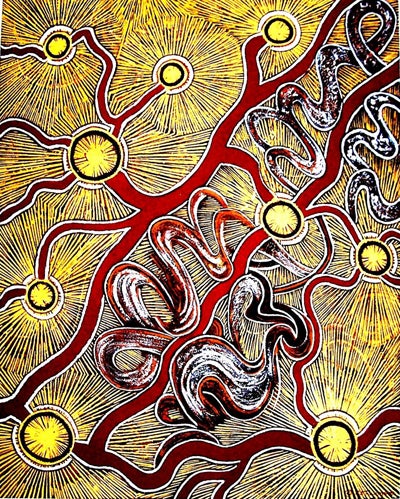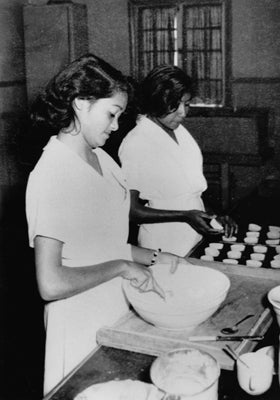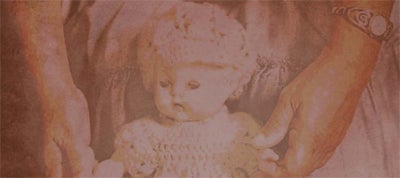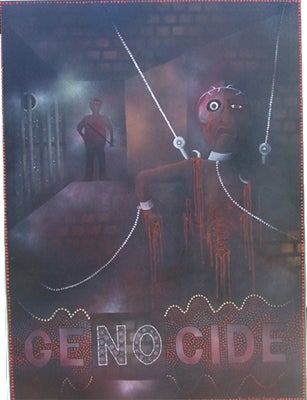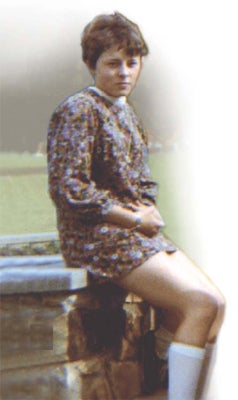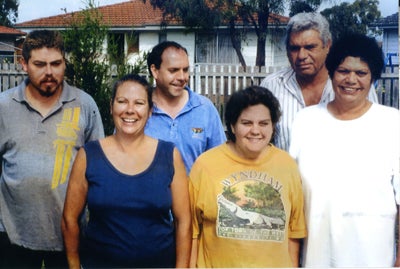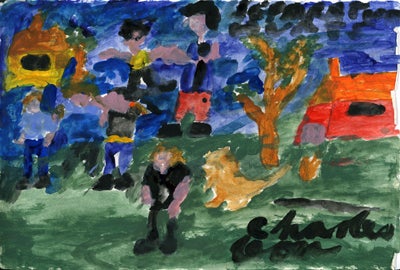'Rough Country', Robert Stuurman
The painting is done with natural pigments and is about the journeys of people who are either finding their identity or have found it through reunions.
Rough country is also out connection with the land as depicted by red ochre. It represents the life-blood of the country and also flows through our veins. Such intrinsic connection, are also with those who are not aware of this because they were taken away form their families or have lost it through past generations. Rough country is also reflected as life's journey with constant brown waves and swirls. The white pigment represents the good that can come out of such struggles in the shaping of character but does not necessarily help in the reconnecting of identity to land.
The yellow circles and lines represent reunions that have taken place where land connection is experienced and people find their place within culture. Even after a reunion though, rough country can still be there are adjustments along life's journey continue to take form.
The brown ring represents a contract against the yellow and indicates a defining moment when a reunion takes place. There are nine circles because nine represents a number of finality.
When identity is re-established, the land isn't as rough as it was to the individual and a sense of belonging allows the land to be like a mother to us.
If we do not respect the land then rough country is also experienced and can reflect in a number of difference ways such as salinity, fire, flood and drought. If one looks carefully the painting also represents a bushfire with not so noticeable cross sections of logs, yellow sparks and smoke. Fire is a life giver as well which also has correlations with the general meaning of the painting.
We must all learn to love the country we are from as it is part of our identity.
I am one of the Mission Children
Question Time
Can anyone answer my question
What did I ever do wrong?
Why did you take me from my parents
When I was only young
You took me in a black car
With balloons all hanging out
Just me and my brother
We didn't know what this was all about
We didn't have a mother
To cuddle and kiss good-night
We didn't have a father
To teach us man's way in life
A mother and father's love
We never ever shared
Will someone answer our questions
Or are some people scared?
- Fred Clark
“I am one of the former Mission Children and I was taken without our Parent's knowledge by a Catholic Missionary on the Mission truck with my brother and Cousin, they are both now deceased. I was brought up by the Catholics for 10 years, when my mother went to the Native Welfare in Narrogin to ask for us back, the welafre said no. Mum went screaming pulling her hair out of her head. Mum and Dad, now both deceased, walked all the way to Francis Xavier Mission in Wandering to ask the Father Superior for us. We were not allowed to go home with our parents so you can imagine what Mum felt like. My Chores were milking cows at 5am in the morning when the grass was wet with dew, no shoes when clearing fields of roots and rocks. I did not have a childhood. Jennifer Narkle, my wife, was also in Mogumber Methodist Mission near Moora. Six of my family was there, we had no Parents to guide, love and nurture us, it was total strangers to handle our every needs. We also lost our childhood by being taken away from our Parents.”
–Harry Narkle
Photograph: Domestic Science Training, Cherbourg, 1959. Left to right: Lorita Saunders and Mildred Dunrobin.
Photograph reproduced courtesy of the State Library of Queensland and the community of Cherbourg.
We were left in the control of our grandmother on the Island after our mother died. And, she was brought over to visit me in the Home... I feel she just wanted to come and justify why we were taken and give us a hug and a kiss, because I had never known her... and she was denied that. I asked the foster mother, who is that old lady who looks through the gate and she said 'oh, she is some silly old black woman.'
- Eddie Thomas, interview with Janet Drummond
The Wicker Chair
You thought I was cute didn`t you
Ensconced in the tiny wicker chair
In the warmth of your kitchen
Not mine
Your matronly bulk, grey hair
And motherly air
Not mine but theirs
You cooked for your family
A plate for me
And listened abstractedly
Tight-lipped, disapproving
To my excited childish chatter
Incessant, as I gave you my life
Not yet three, for free
I didn`t know, not then
That you had stolen me
- Vickie Roach
Little China Doll
Hey little china doll, why don't I see you smile?
'They took away my toys and made me run for miles.
So little china doll, why the great big frown?
'they dragged me from my bed, to dig up frozen ground.'
Well, my little china doll, why don't you ever speak?
'try that 'round here, they'll isolate you for a week.'
But little China doll, what do they feed you in that quarter?
'Just a slice of plain bread and cup of luke warm water.'
What, little china doll, does go on with you?
'They froze my heart and they will yours too;
They've hit me with their fists of broken glass
And till this day, the nightmares last.
So tell me little china doll, how do you survive?
'There's only one place where a little girl can hide;
There are places in my mind, where they can never go.
They really resent that, you'd be shocked to know.
Dear little china doll, you seem like walking dead.
'That I am; everywhere except inside my head.'
How do you know china doll, that you did survive?
'I cut myself every week to feel if I'm alive.'
You're much too broke for me to fix, little china doll;
Your mind is strong but your heart so very cold.
'Just throw me back on the heap, they have since I was ten years old.
- Jeannie Hayes
I dedicate this poem to all the Hay girls who
served time before me, with me and after me.
Photograph reproduced courtesy of The Penrith Press (www.penrithpress.com.au)
Eddie Thomas: ``...the biggest game of football I think I`ve ever played... was in Hobart and it was combined VFL performance in Tasmania, the best footballers in Tasmania, and I am walking into the change room, and there`s this dark chap coming toward me and he said `Eddie`. It was my brother, and I was all emotional and I sat down and said, `well, I`m not playing footy today; I want to spend time with you.` And he said, `play, Eddie, let me see you play.` And out of the match, at the end of the match he was able to come into the club rooms and I was presented with one of the trophies for the best player of the day, and we certainly had some wonderful times after that.``
Janet Drummond: And, so you played the game of your life for your brother?
Eddie Thomas: I did, yes, I did. I made him proud. I was thinking of him out there and it just made me feel that I had to do something to prove myself to him, but I didn`t have to do a thing. I just think he was lost. He just could not accept what had happened, he never seemed to talk about it, and he never got over it. Even though my sister was nine years older and she could have helped him but I can never recall that she did talk to him about the times in the home, for some reason. But he just pined away really and never got over it.
It was September, the 28th 1981. I was thirty-eight-years of age and about to meet my mother, Hazel, for the first time.
I was more curious than nervous. What did you call a mother you had never met before? We had spoken on the phone two nights ago. Hazel said she was Aboriginal, and that she and my grandmother had wanted to keep me, but had been forced to give me up.
I am looking at this woman walking towards me, smiling. She looks Maori. I want her to go away, she's not my mother. My mother's white, and my biological father is Negro. That's what my father said, thirteen years ago. He also said that the social worker at the home told him that no one wanted me as a baby and that I could have throwbacks, so I would have to be checked out by a doctor before I had a baby.
We are a few feet apart, when I realise who this woman is. Hazel told me what she looked like on the phone. I want to scream, because nothing my father told me was true.'
- Lorraine McGee-Sippel
Painting: 'Genocide', Kevin Butler, 2004.
'With many years of continuous abuse it feels as though one's culture and spirit are slowly being torn away from black flesh, whilst having to assimilate into their alien lifestyle.'
My sister, Denise, and I are in our 50`s and it has taken over 30 years to finally find our family connections.
Denise searched with the help of many others and was able to take our family back four generations and collect some very interesting historical information about the stolen generation and life on a mission in the 1800`s - 1900`s.
We always knew we were different when family came to visit but our parents hid the truth and it was only later we were actually told we were Aboriginal.
Today we now know we are from the Wiradjuri people, our great great grandmother went to the Warangesda Mission and our great grandmother was part of the stolen generation when she was taken from her family and kept in the mission until she was sent out as a domestic to a station and then married the white owner.
– Rooth Wilay Robertson
There was one night when I had just arrived at the showers under escort and my mate Beverley was there. We were the only two at the showers plus the screw. Beverly was just exiting the tub area after washing her pants and I was just going in to do mine, so as I passed her I kissed her on the cheek and the screw caught me. I was sent to to the office. The screw called me a dirty thing and slapped my face.”
- Jeannie Hayes
Photograph: Jeannie Hayes, photograph taken after her release from the Parramatta Girls Home, 1970. Photograph reproduced courtesy of Jeannie Hayes.
Baby Bunting
Your little baby Bunting,
Now grown has gone a hunting,
With wommera in hand.
And walks this ancient land,
Through many years of searching,
Over vast tracks unearthing,
Hidden pasts from `their` keep,
In futures truth does seek,
The right story now to tell,
To hand down and dispel,
Fiction`s asseverate wrongs,
For her Daughter`s future songs.
- Yveane Fallon
I was adopted when I was 6 weeks old by lovely people. My mum was English and my dad was Australian we lived in Sydney and I have a brother named David 10 yrs older then me.
I didn't know I was Aboriginal till I was about 12. It was a bit scary and I wondered about my birth mother. I read about Link Up but because I didn't know anything I just put it in the back of my head always being there.
Much later, I met my husband- to- be, Alwyn. He was also taken away when he was six years old and was fostered with a family. He was finally reunited with his family and mother where we were all together it was an emotional time for all. Not long after, his mother passed away. He has two brothers and four sisters. We go back home a lot to catch up with everybody.
Photograph: Kerrie Roberts and her family. Photograph courtesy of Kerrie Roberts.
One day Alwyn told me he had three foster sisters and a brother their names are Cindy Dargon, Eve Leon, Delia Jerrett (dec), Douglas Boney. Anyway, one day Alwyn said “I want you to meet one of my foster sisters, Delia”, she lived in Cessnock. So we went up Al myself and Doug.
We all stayed at her house and met her children she had a boy Norm and a girl Rachelle. The next day, Delia (or Della) wanted Al and Doug and myself to go and see Aunty Marie who was living up there too. Over lunch, we got talking.
I told Delia and Aunty Marie I was Aboriginal and was trying to find my family. Aunty Marie couldn't think of Della's last name, but it started with 'J'. I said my last name started with J because my mother's name was Ada Evelyn Jerrett Smith and she said “Ohhh! that's my mothers name!” we were in shock and just went silent.
Aunty Marie rang mum in Tasmania and she couldn't believe it- that's how I found my sister Dell. I met nieces and nephews and another sister Violet. My mother has passed on a long time ago. I never got to know her and I don't know who my father is. After a few years we discovered that we had another two brothers and a sister so altogether there are ten, Ronald, Clancy, David, Wayne, Kevin, Jason, Violet, Delia, Kerrie, Joanne.
- Kerrie Roberts
Let`s Go Home
Oh little one, I`ve come to take you
Home where you belong
You`ve waited here alone and sad
For me for far too long
I don`t know how I could have left you
In this awful place
But here now, take my hand
And dry those tears upon your face
It`s taken long I know
But there were mountains in my path
And rocky roads led me astray
And plunged me into dark
But suddenly, I found the way
And I had to come for you
`Coz little one, I`m goin` home
And I`m takin` you with me too
- Vickie Roach
Painting: 'My House, My Family', Charles Larry Leon, 2007

